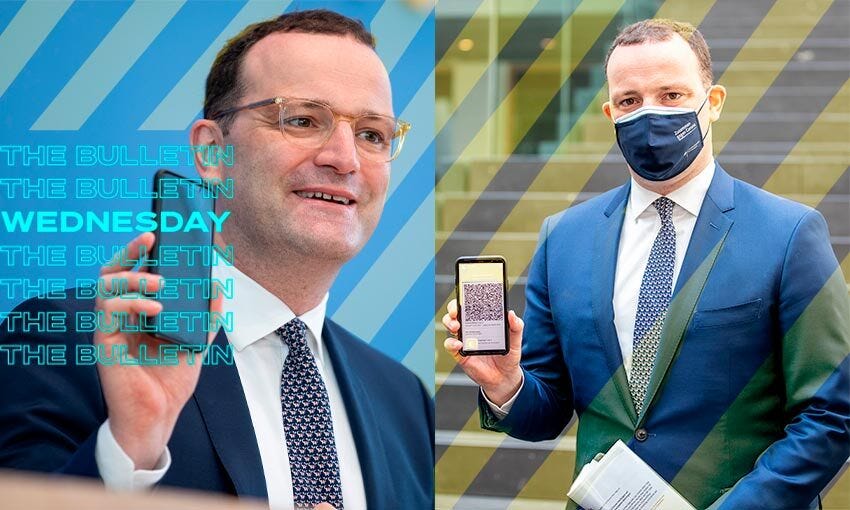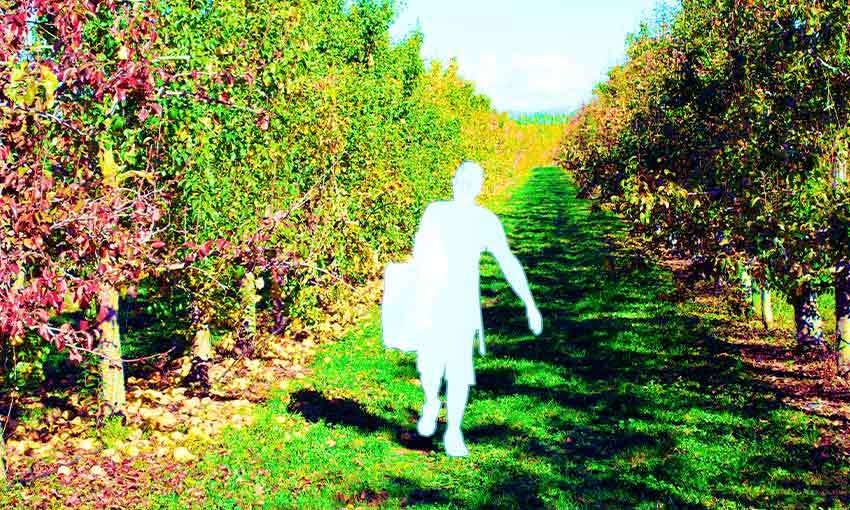
Your vaccine pass is ready
Before a move to the traffic light system, the fully vaccinated can download the passes later today that will be required to enter restaurants and other businesses
Mōrena and welcome to The Bulletin for Wednesday, November 17, by Justin Giovannetti. Presented in partnership with Z Energy.
In today’s edition: Auckland students return to school; MPs to get more security after threats; National sticks with housing bill; but first, vaccine passes to be available today.
The government says vaccine passes will be a part of daily life. (Tina Tiller)
Vaccine passes are nearly here. An easy-to-use proof of vaccination is one of the cornerstones of the government’s plan to end lockdowns and get on with summer. The passes, also called certificates or passports, are an essential part of the traffic light system that could be implemented within the coming weeks to replace alert levels. You’ll need to show one before entering many businesses. The prime minister is expected to announce firmer plans later today about when the change to the traffic light system is likely. The government’s My Vaccine Pass system is set to go online today and, according to Covid-19 minister Chris Hipkins, provides a “ticket to enjoy the extra freedoms that will come” this summer.
“The pass will mean people will be able to do the things they love, like going to concerts and music festivals, nights out at bars and restaurants, and going to the gym and sports events,” said Hipkins. He added that the pass will become part of a daily routine, like carrying around a driver’s licence.
How will it work? The pass has your name, date of birth and a QR code that is scanned when you arrive at a business or venue. It can either be stored on your phone’s wallet or carried in printed form. The information on the QR code will be matched with a central database maintained by the Ministry of Health. People might also be asked to show photo ID to ensure their name matches the details on the pass.
How do I get it? You’ll first need to sign up for the pass at My Covid Record and they should be available later today. You’ll need a personal email address–shared household emails won’t work. The government isn’t asking for people to necessarily request a pass today, but to get their profiles set up. It’ll likely be a few weeks before the traffic light system kicks in. You can also call 0800 222 478 if you don’t have a computer or a required form of ID.
Where will it be required? The proof of vaccination will likely need to be shown by everyone over the age of 12 at events, hospitality venues, retail, community events, airports, sports and faith-based gatherings. On the other side of the ledger, supermarkets, pharmacies, health services, petrol stations and schools are some of the few places that won’t be allowed to deny entry based on vaccination status.
People who aren’t vaccinated or don’t want to carry a pass will likely be denied entry to most businesses in the country next year. Businesses will have the option of not asking for vaccine passes, but even under the lowest level of the traffic light system, it’ll come at a heavy cost. Under the green level, choosing to forgo passes means they’ll have strict capacity limits and will need to maintain social distancing between patrons who will be required to remain seated. At orange or red, many will need to close or remain contactless.
Who won’t need a pass? Children under the age of 12 and people with a valid medical exemption, the latter category is very small, likely fewer than 100 people in the entire country.
Will booster shots be included in the system? Eventually, yes. A pass will only be valid for six months and the government has now warned that the definition for “fully vaccinated” could be changed in the near-future to require a booster.
How long will this last? The government says “until further notice” for domestic use, however an international system could last much longer. New international vaccine certificates are now available as well that include a QR code that can be scanned overseas. It’s a separate system because other countries are using different forms of codes with different information requirements. Don’t try to travel with your domestic vaccine pass, it won’t work. The European Union was the first jurisdiction to accept New Zealand’s international certificates, but more approvals are likely to follow. “It’s anticipated that the need for proof of a vaccine certification when travelling internationally will be in place for years to come,” according to the government.
A message from The Spinoff’s new editor Madeleine Chapman:
Like any good door-to-door salesperson, I’m about to cheerily introduce myself and then, in the very next breath, ask you for money. Hi! I’m Madeleine (or Mad) Chapman, previously an intern at The Spinoff, then a staff writer, senior writer and now editor. It certainly wasn’t the plan to step into this role in the middle of a delta outbreak, nor did I think my first weeks on the job would unfold alongside New Zealand’s largest city slowly coming out of stagnation. But despite the strange and unfortunate circumstances, The Spinoff team has stepped up once again, working tirelessly (and mostly from our bedrooms) to bring you the most important news when you need it, and the lighter moments when things are looking a little bleak. We’ve been able to continue this work because of the ongoing contributions from our members and I can’t thank you enough.
But can I boldly ask that you consider becoming a member if you aren’t one already? If you’ve read something on our site recently that you enjoyed or appreciated, consider it a koha for that alone, because every dollar donated through The Spinoff Members is used to create more of the work you see every day. With Christmas around the corner (which I’m finding genuinely hard to believe), there’s no such thing as shipping delays on a membership of The Spinoff bought for whānau and friends.
Students are returning to schools in Auckland and Waikato. While nearly all years 9 and 10 can return full-time this morning, the situation has been more complicated for years one through eight. Each school and kura has been asked to come up with its own plan. Some have offered staggered days, while others are splitting the return to classes by gender.
If your child is heading back to class today or later this week, we’d love to know how their school is planning for the return, please send The Bulletin an email.
The return to class coincides with the start of vaccine mandates in the education sector this week. While there have been concerns about educators losing their jobs, a survey by the principals’ federation found less than 1% of teachers refused the vaccine, according to Stuff. There were also reports of teachers getting vaccinated on Monday, the deadline to do so.
The Covid numbers: There are 91 cases in hospital and 7 in ICU/HDU. There are now 3,846 active cases in New Zealand. 197 new community cases were reported in Auckland yesterday, 20 in Waikato, 2 in Wairarapa, 2 in Taupō and 1 in Northland. 21,442 people were vaccinated on Monday.
The Spinoff’s Covid data tracker has the latest figures.
MPs getting more security after death threats from anti-vaxxers. Kieran McAnulty, Labour’s chief whip, said parliamentary security will now provide more security for MPs at their residences in Wellington. As RNZ reports, parliamentarians could also be issued with personal panic buttons. McAnulty received death threats after an anti-vaccine protester confronted the MP and claimed he was committing genocide. After an anti-government protest at parliament last week and a New Zealand-wide rise in disinformation, MPs report that the rhetoric and threats they face are becoming increasingly heated. In a country where ministers could often be seen walking down the street without staff, many are reporting that they now need to change their behaviours to be more security-conscious.
National sticks with cross-party housing plan despite sharp criticism. Labour and National are rushing a bill through parliament to allow property owners to build three houses on any section without council consent. Despite causing some of the opposition party’s supporters to say it’s going to create a “communist-era slum metropolis” in Auckland, the NZ Herald (paywalled) reports that National will continue to co-sponsor the effort.
While there have been some cynical takes on the legislation, a big bipartisan push to create affordable housing is pretty unusual in the English-speaking world at the moment. A recent video from The New York Times, sent to me by a reader, captures just how incredibly American legislators in Democratic-controlled states have bungled affordable housing because of pressure from property owners.
Rachel MacGregor awarded $400,000 in damages from Colin Craig. The former press secretary to one-time Conservative party leader Colin Craig has been awarded damages after a years-long legal saga. As RNZ reports, judges across multiple court proceedings have found MacGregor was sexually harassed by Craig. A series of lawsuits and countersuits have worked their way through the legal system and through numerous appeals, but Craig has now been ordered to pay damages. While you’d think this would be the end, it might not be. “Craig said he would take some time to consider the judgment before deciding whether to appeal it”, RNZ concluded.
Russian anti-satellite weapons test puts space station at risk. In what feels like a less catastrophic retelling of the plot from the movie Gravity, astronauts in the International Space Station have had to shelter in re-entry pods over the past day. As The Guardian reports, Russia fired a missile at one of its own satellites and created a storm of orbital debris, with over 1500 large pieces being tracked. A fleck of paint in orbit can cause real damage, so hundreds of thousands of small pieces that can’t be detected are a cause for concern. The station is now flying through the swarm of debris every 90 minutes. Nasa is extremely displeased.
Got some feedback about The Bulletin, or anything in the news?
Get in touch with me at thebulletin@thespinoff.co.nz
Right now on The Spinoff: George Driver reports on what the work is like amid more warnings of worker shortages on fruit orchards. Caitlin Allen, an ICU nurse in the UK, writes a plea for people to get vaccinated. Bernard Hickey speaks with a company looking to build high-quality, affordable rentals in New Zealand. Shanti Mathias reports for IRL about the technology behind weather forecasting. Justin Latif finds, through released documents, that cabinet never considered prioritising South Auckland for vaccines.
For a longer read today: T-Day, the battle for Taiwan. New Zealand’s foreign minister is currently travelling the Pacific and warning about rising nationalism. One of those spots of tension is between Taiwan and China. Reuters has unveiled a weighty investigation into the situation and concludes that Beijing’s campaign to take the island country is already underway in a form of “gray-zone warfare”. Here’s some of what was written in a must-read story about the future of the Pacific:
“As Reuters reported in December, the Chinese military – the People’s Liberation Army – is waging so-called gray-zone warfare against Taiwan. This consists of an almost daily campaign of intimidating military exercises, patrols and surveillance that falls just short of armed conflict. Since that report, the campaign has intensified.”
The myth of netball’s start in New Zealand. Most sports have a simple creation story that doesn’t quite match the history. The assumption in New Zealand has been that '“women’s basketball” was introduced in 1906 by a travelling reverend. RNZ looks at the long history of how netball got started here and whether the myths match the facts.
That's it for The Bulletin. If you want to support the work we do at The Spinoff, please check out our membership programme.













